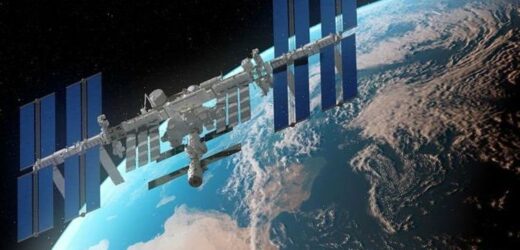NASA creates simulations of a star passing a black hole
We use your sign-up to provide content in ways you’ve consented to and to improve our understanding of you. This may include adverts from us and 3rd parties based on our understanding. You can unsubscribe at any time. More info
Flight controllers warned NASA astronauts that a piece of rocket may pass very close to the ISS today. The debris is part of an old Pegasus rocket that was launched by the US in 1994. According to NASA, the breakup of this rocket’s upper stage took place on June 3, 1996.
NASA said it was examining the “potential risk” of this debris.
They added: “Mission Control is working with NASA international partners to prepare for a possible debris avoidance manoeuvre.
“The Expedition 66 crew is not in any additional danger.”
Now it has been confirmed the ISS had to swerve away from a fragment of a US launch vehicle on Friday.


Dmitry Rogozin, head of Russian space agency Roscosmos, said on Friday that the ISS had been forced to move.
Roscosmos said the station’s orbit, in an unscheduled manoeuvre carried out by mission control, dropped by 310 metres (339 yards) for nearly three minutes to avoid a close encounter.
Mr Rogozin added that the manoeuvre would not affect the planned launch of the Soyuz MS-20 rocket on December 8 from the Baikonur cosmodrome in Kazakhstan and its docking at the ISS.
Debris forced NASA to postpone a spacewalk on Tuesday to replace a faulty antenna at the ISS.
DON’T MISS
EU cracks show as Germany ‘makes mockery’ of bloc’s rules [REPORT]
AstraZeneca breakthrough as ‘no evidence’ Omicron can escape vaccine [INSIGHT]
China war fears erupt as submarine snapped in Taiwan strait [REVEAL]

It came after Russia received heavy criticism for performing an anti-satellite (ASAT) test on an old rocket.
The Russian military destroyed a defunct satellite with an on November 15.
It was blasted into more than 1,500 pieces and caused astronauts on board the ISS to have to shelter.
The test drew widespread condemnation from U.S. officials, which Russian officials responded by calling “hypocritical” given past American military tests in space.

The Pentagon has now called for a global halt to anti-satellite weapons testing.
US Department of Defense deputy secretary Kathleen Hicks, said: “We would like to see all nations agree to refrain from anti-satellite weapons testing that creates debris.”
To date, four countries – the U.S., Russia, China, and India – have previously destroyed their own satellites in ASAT tests.
But Ms Hicks’ comments mark the most direct call to action since the Russian demonstration.

Vice US President Kamala Harris agreed with Ms Hicks.
She added: “By blasting debris … [Russia] endangered the satellites of other nations, as well as astronauts on the ISS.
“The test created a moment for us to really see very clearly what can happen and what potentially can be avoided with norms and rules.”
Source: Read Full Article


